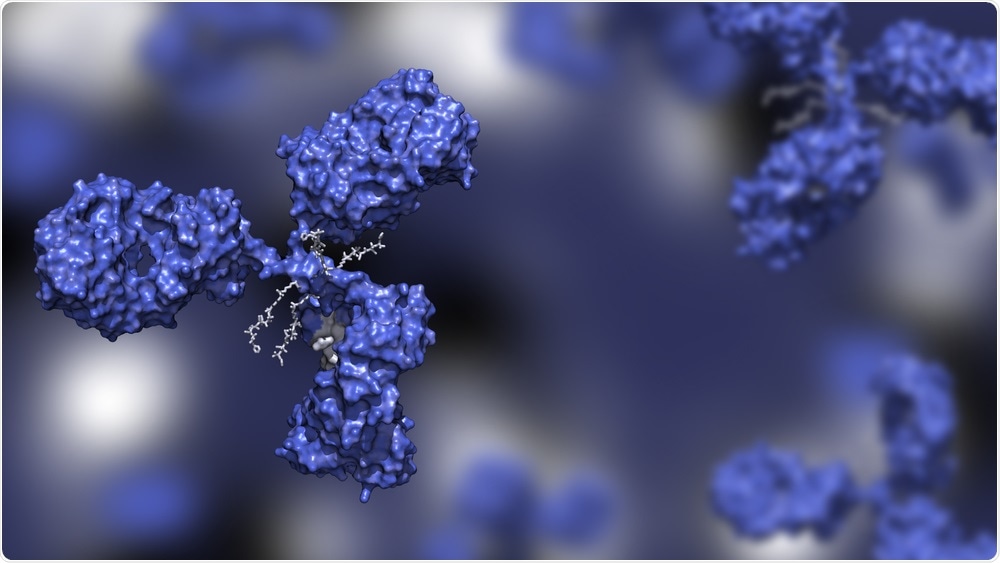The coronavirus disease 2019 (COVID-19) pandemic, which was triggered by the spread of the severe acute respiratory syndrome coronavirus 2 (SARS-CoV-2), has caused immense damage to the global economy, as well as over 4.75 million deaths. In the absence of effective antivirals, governments have implemented various non-pharmaceutical interventions ranging from shelter-in-place orders to handwashing advice in their efforts to reduce viral transmission.
 Study: Monoclonal Antibodies Therapy for Covid-19 - Experiences at A Regional Hospital. Image Credit: Huen Structure Bio / Shutterstock.com
Study: Monoclonal Antibodies Therapy for Covid-19 - Experiences at A Regional Hospital. Image Credit: Huen Structure Bio / Shutterstock.com

 This news article was a review of a preliminary scientific report that had not undergone peer-review at the time of publication. Since its initial publication, the scientific report has now been peer reviewed and accepted for publication in a Scientific Journal. Links to the preliminary and peer-reviewed reports are available in the Sources section at the bottom of this article. View Sources
This news article was a review of a preliminary scientific report that had not undergone peer-review at the time of publication. Since its initial publication, the scientific report has now been peer reviewed and accepted for publication in a Scientific Journal. Links to the preliminary and peer-reviewed reports are available in the Sources section at the bottom of this article. View Sources
Background
As COVID-19 hit developed countries fiercely and rapidly, with hundreds of thousands being hospitalized for severe respiratory distress and multi-organ dysfunction, new drugs and techniques were in high demand. Drugs and procedures used in the treatment of cancer, for instance, were quickly re-examined for their potential utility in treating this disease.
Among these were the class of monoclonal antibodies (mAbs), which have been developed for several autoimmune and malignant conditions. The mAb cocktails of Bamlanivimab/Etesevimab and Casirivimab/Imdevimab were found to offer a potential benefit in reducing the severity of COVID-19 in patients with certain underlying risk factors.
These antibodies target the SARS-CoV-2 spike antigen that is responsible for virus-host cell binding via the angiotensin-converting enzyme 2 (SARS-CoV-2) receptor. In order to prevent the rapid emergence of escape mutations, these antibodies must target epitopes or antigenic sites that show little or no change between variants.
Failing this, combinations are used to prevent immune evasion via mutations at one location on the spike protein. The occurrence of such successful immune escape would promote the selection of such mutations so as to culminate in the emergence of a resistant strain.
The current study used data on mAb cocktail use at a regional hospital dealing with COVID-19 patients. Patients were informed about the therapy. All participants had more than one risk factor for a poor outcome and were treated within a week of receiving a positive test for SARS-CoV-2 by the reverse transcriptase-polymerase chain reaction (RT-PCR) following symptom onset.
Study findings
The current study included 34 participants who were treated with either bamlanivimab alone or a cocktail of casirivimab and imdevimab between March to June 2021. The control group was treated with the same standard of care as the antibody recipients, except for the mAb therapy.
The time from the first positive RT-PCR test to hospitalization differed between cases and controls at 9 days as compared to 17 days. Accordingly, blood gases were lower. Almost twice as many patients presented with cough in the treatment cohort; however, breathlessness at presentation was three times more common in the control group.
There was no difference in mortality risk following a positive diagnosis. The viral load was also comparable between the groups, as demonstrated by the cycle thresholds during the hospitalized course of illness in either group.
The duration of hospitalization was shortened following mAb treatment, which was in agreement with large studies that have been previously published. It appears that high-risk patients must be identified early and administered this drug before they show severe symptoms, in which case mAbs can significantly reduce the progression of the disease.
Implications
This reduction in hospital stay for survivors could be key to avoiding the overwhelming demand on hospitals during the periods when the COVID-19 incidence rises.
“To achieve this, we have encouraged residential physicians by mail and media to immediately direct their SARS-CoV-2 positive patients having significant risk factors and beginning symptoms to our hospital for early therapy.”
Despite the efficacy of the mAbs in reducing the time spent in the hospital, no reduction of cycle threshold values was seen. Again, 12% of cases as compared to 10% of controls succumbed to the disease. These findings point to the need for further studies to evaluate the cost-effectiveness of this therapy in saving lives and preventing serious complications in high-risk COVID-19 patients.

 This news article was a review of a preliminary scientific report that had not undergone peer-review at the time of publication. Since its initial publication, the scientific report has now been peer reviewed and accepted for publication in a Scientific Journal. Links to the preliminary and peer-reviewed reports are available in the Sources section at the bottom of this article. View Sources
This news article was a review of a preliminary scientific report that had not undergone peer-review at the time of publication. Since its initial publication, the scientific report has now been peer reviewed and accepted for publication in a Scientific Journal. Links to the preliminary and peer-reviewed reports are available in the Sources section at the bottom of this article. View Sources
Journal references:
- Preliminary scientific report.
Pannier, J., Nass, N., & Behre, G. (2021). Monoclonal Antibodies Therapy for Covid-19 - Experiences at A Regional Hospital. medRxiv. doi:10.1101/2021.09.22.21263488. https://www.medrxiv.org/content/10.1101/2021.09.22.21263488v1.
- Peer reviewed and published scientific report.
Pannier, Judith, Norbert Nass, Mohamad-Kamal Yaakoub, Florian Michael Maria Stelzner, Susann Veit, Margarita Kalomoiri, Mahdi Yassine, and Gerhard Behre. 2023. “Monoclonal Antibody Therapy for COVID-19: A Retrospective Observational Study at a Regional Hospital.” Infectious Disease Reports 15 (1): 125–31. https://doi.org/10.3390/idr15010013. https://www.mdpi.com/2036-7449/15/1/13.